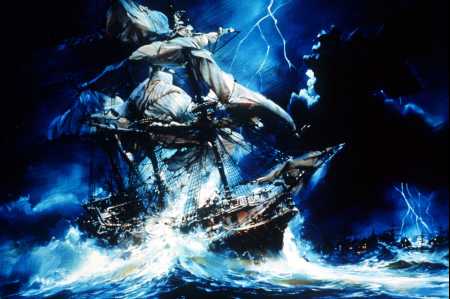
 |
Historians are divided over whether blacks fared much better as pirates, however. W. Jeffrey Bolster of the University of New Hampshire, for instance, acknowledged that black pirates enjoyed some privileges: One was Captain Kidd's quartermaster and several belonged to Blackbeard's crew. But Bolster also said many pirates were psychopathic criminals who ``happily raped captive African women'' and kept black slaves on board to do the most onerous jobs. ``For us to say these white pirates always accepted the black men as equals is nonsense,'' Bolster said.
Historian Marcus Rediker of the University of Pittsburgh, author of the 1987 book Between the Devil and the Deep Blue Sea, insist pirates practiced a type of democracy revolutionary for the times, nearly two centuries before slavery ended in the United States. The ``Golden Age of Piracy'' lasted from 1680 to 1725, with at least 10,000 pirates roaming the seas at its height, according to Kinkor, who estimated at least one-third of them were black. Historians say buccaneers voted on all major decisions, elected their leaders, split their booty fairly and established compensation for injured pirates and the families of dead pirates. The democratic ways extended to blacks, who could escape slavery and rise to command a ship or an entire fleet, Rediker said. ``They could either be a law-abiding slave or an escaped convict or a pirate with a chance at the golden ring,'' added marine explorer Barry Clifford. Clifford has found what are believed to be the only pirate ships in the world discovered to date so far: the Whydah off Cape Cod in 1984, two pirate ships off Venezuela in 1998 and what he believes is Captain Kidd's ship off the African island of Madagascar last January.
Next week, experts in North Carolina are scheduled to try and recover part of the hull of a ship believed to have belonged to Blackbeard. On Madagascar's tiny Ste. Marie isle, where Kidd's ship apparently sank, pirates brought their ``floating democracies'' to land, said Clifford, establishing a community in about 1680 governed by a constitution that included the right to be free regardless of color. ``It sounds almost like Abraham Lincoln plagiarized it,'' said Clifford, co-author of the 1999 book ``Expedition Whydah.'' Despite evidence of racial parity, even Kinkor and Rediker don't think pirates treated blacks as equals solely out of a grand vision of social justice. They say it also grew out of pragmatism: pirates needed competent, hardworking deck hands, regardless of skin color.
Arguably the most ``successful'' pirate ever was Laurens de Graf, who was one of the buccaneers most feared by the Spanish and who led a fleet that peaked at 2,000 men, Kinkor said. De Graf eventually was pardoned by the French, given a minor title of French nobility and helped found Biloxi, Miss. In history books, de Graf is described as tall, blonde-haired, blue-eyed and white. In reality, he was a black escaped slave. Historians lied about his color because they feared he would serve as an example to other slaves who also might revolt. ``Historians did not want people to know de Graf was black,'' said maritime historian James Nelson of Harpswell, Maine. ``The thought of a black uprising was the most frightening thing in colonial America.''
On the Net: http://www.whydah.com/ and http://www.nationalgeographic.com/whydah/